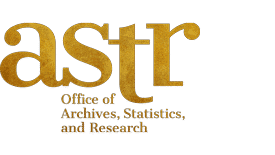True education means more than the pursual of a certain course of study. It means more than a preparation for the life that now is. It has to do with the whole being, and with the whole period of existence possible to man. It is the harmonious development of the physical, the mental, and the spiritual powers. It prepares the student for the joy of service in this world and for the higher joy of wider service in the world to come. ― Ellen G. White (Education, 13)
Since 1853, when Martha Byington opened the first known church school for Sabbatarian Adventists in Buck’s Bridge, NY, Adventist education has sought to teach not only the basics of “reading, writing, and arithmetic,” but has also included a “Kingdom focus” in their curriculum. This focus includes both a solid foundation of biblical teachings and instruction on Adventist/biblical doctrine. The purpose of such education is to send well-rounded young people out into the world balanced spiritually, physically, intellectually, and social-emotionally.((Lake Union Conference, Office of Education, Adventist Heritage: Book II. (Berrien Springs, MI:Lake Union Conference, 1993), https://adventistdigitallibrary.org/adl-366836/adventist-heritage-book-ii?solr_nav%5Bid%5D=3a44d3393347c16a9b45&solr_nav%5Bpage%5D=0&solr_nav%5Boffset%5D=3; Adventist Education, “Frequently asked questions,” Adventist Education, Journey to Excellence, accessed October 27, 2020, https://adventisteducation.org/faq.html; Strayer, Brian E., “Amadon, Martha Dorner (Byington) (1834–1937),” In the Encyclopedia of Seventh-day Adventists (Silver Spring, MD: General Conference Office of Archives, Statistics, and Research, 2020), https://encyclopedia.adventist.org/article?id=58V5&highlight=byington.))
Education continues to be an important element of Adventism today. According to the Adventist Education (n.d.) website, the Adventist Church is associated with 7,500 educational institutions operating in nearly 150 countries around the world.((Adventist Education, “About us,” Adventist Education, Journey to Excellence, accessed October 27, 2020, https://adventisteducation.org/abt.html)) In addition, as we have discussed in past blogs, research has shown that young people who attend Adventist educational institutions are more likely to remain in the Adventist church throughout their lives. (See more in a previous blog.)
As part of the 2017-18 Global Church Member Survey (GCMS), members were asked about various aspects of education, including their enrollment in Adventist schools. Initially, when members were asked about their highest levels of education (in general) at the time of the survey, results showed that two thirds (66%) of respondents had completed high school and/or attended higher education (i.e., some college, 13%; completed college or university, 21%; are graduate school or professional school graduates, 9%). Interestingly, a small percentage (2%) indicated that they had never attended school.
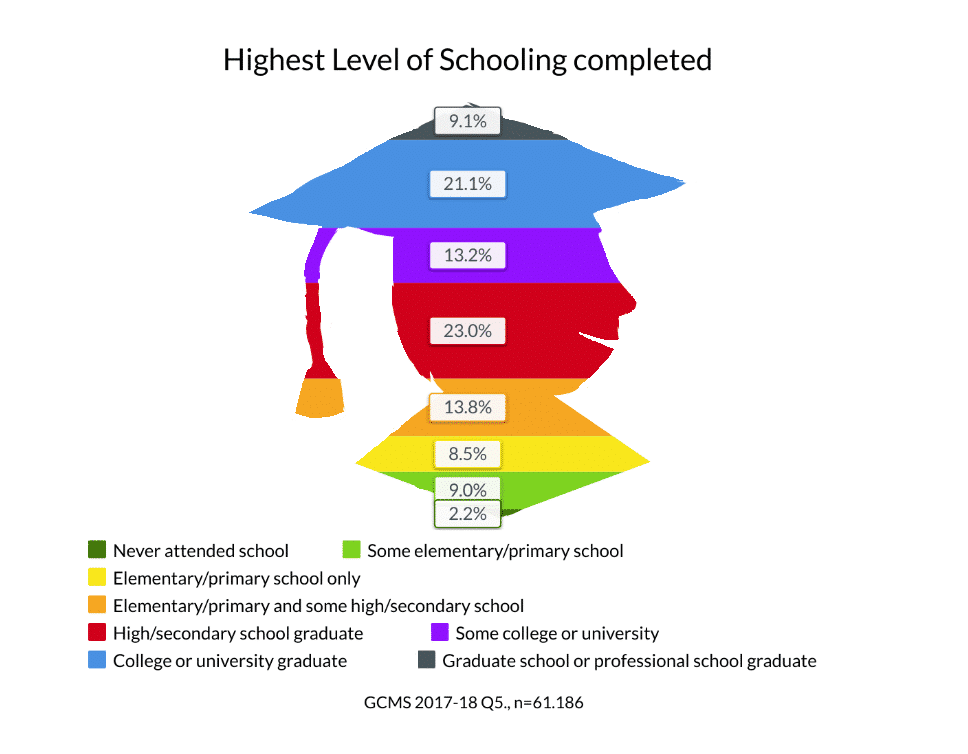
When asked about how many years they had attended a Seventh-day Adventist institution, nearly half (47%) of the respondents shared that they had never attended an Adventist educational institution. Nineteen percent of the respondents had received one to four years of Adventist education, while another 14% had received five to eight years. Similar numbers had received nine to 12 years (9%) or 13 or more years (10%) of Adventist education. This presents a challenge for the Adventist Church. How should it help young people studying in secular schools to develop a Bible-based worldview?
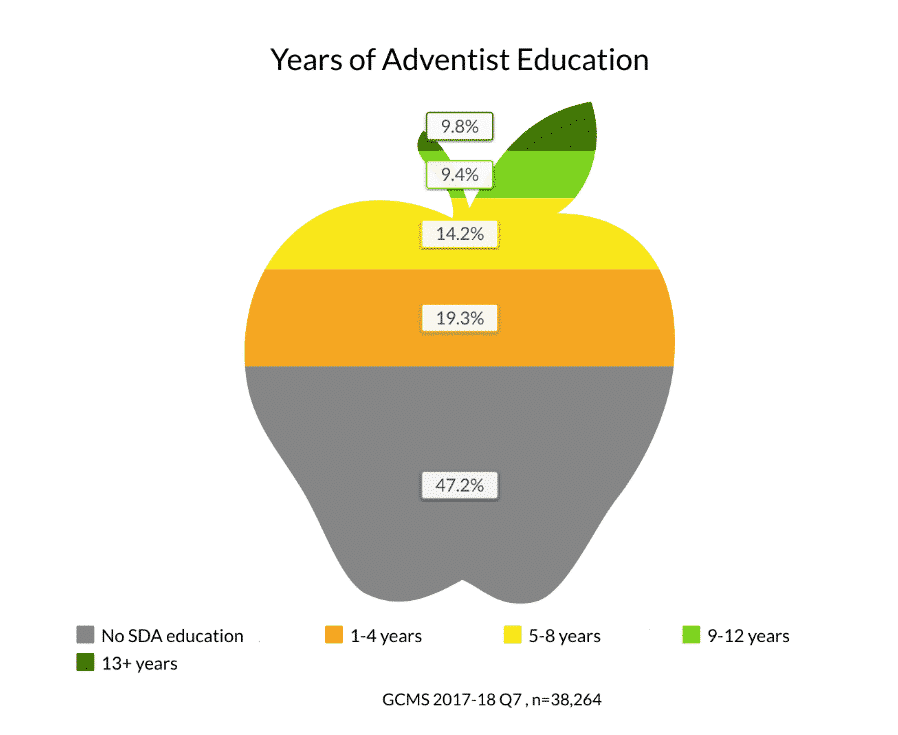
For those who had attended an Adventist school, it was more common for them to have done so early in their education. Approximately 18% of respondents had attended an Adventist school during their elementary/primary years, 17% had attended an Adventist high/secondary school, and 13% had attended an Adventist college or university. Only 4% of respondents had attended an Adventist professional or graduate school, which means that more than half of those with post-graduate degrees had received their education in non-Adventist schools.
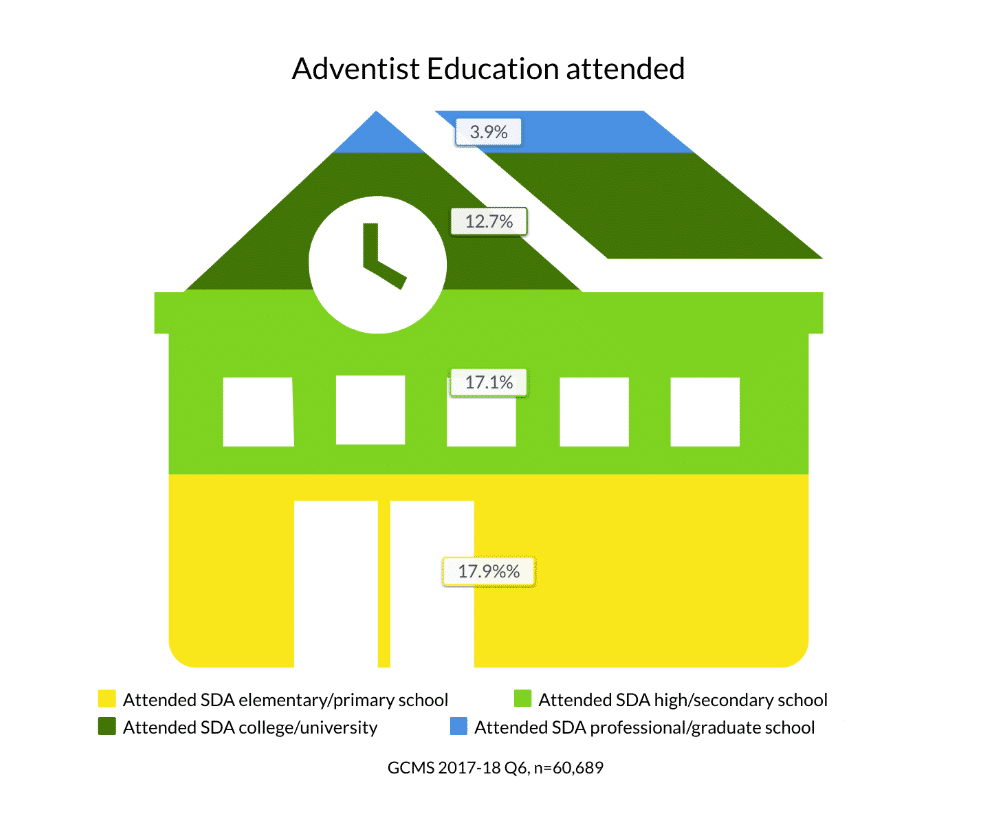
One might question whether Adventist education was valued in respondents’ families of origin, as this would likely have had a large influence on their attendance―or the lack thereof―of an Adventist educational institution. While over half (53%) of the respondents agreed that Adventist education was important in their family of origin, these numbers are not reflected in actual attendance; this disconnect may be related to a number of factors, including their family’s proximity to an Adventist school, as well as the expense/financial burden of Adventist education.
Fifteen percent of the survey participants shared that Adventist education was not valued in their home when they were growing up. Interestingly, almost a quarter (24%) of the respondents indicated that this question did not apply to them; this may be because many of these members were not raised as Adventists, and thus SDA education was a non-issue.
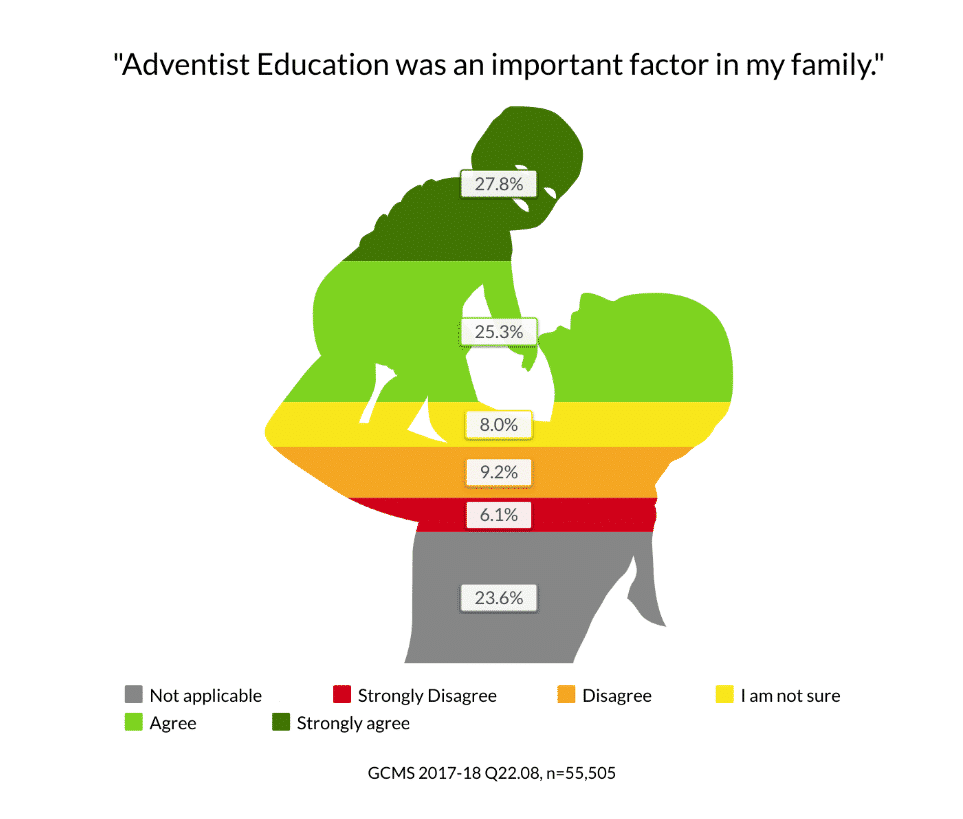
As we consider the value and importance of Adventist education, we invite you to consider some important questions:
- Why are so many children not enrolled in Adventist schools?
- Do we have enough Adventist school locations available to young families?
- Do we offer enough financial support to enable families to attend Adventist education?
- With Adventist education setting such an important foundation for young people, how can we encourage attendance at Adventist schools?
- What does your local congregation do to facilitate enrollment in Adventist schools or to invest in Adventist education?
- How can you, personally, be involved in supporting and promoting Adventist education?
Adventist education has a mission “to enable learners to develop a life of faith in God, and to use their knowledge, skills, and understandings to serve God and humanity.”((Ibid.)) It prepares students to be a blessing to their communities now and to be citizens of the eternal kingdom of God.
Let us support our schools and invest both time and money in Adventist education. In this way, we are investing not only in the future of the Adventist Church, but also in the Kingdom of Heaven.
Creado en colaboración con el Instituto del Ministerio de la Iglesia (Institute of Church Ministry).
Published by ASTR
